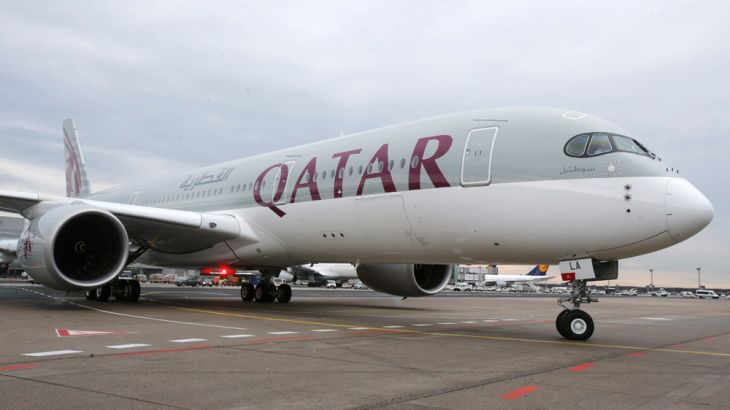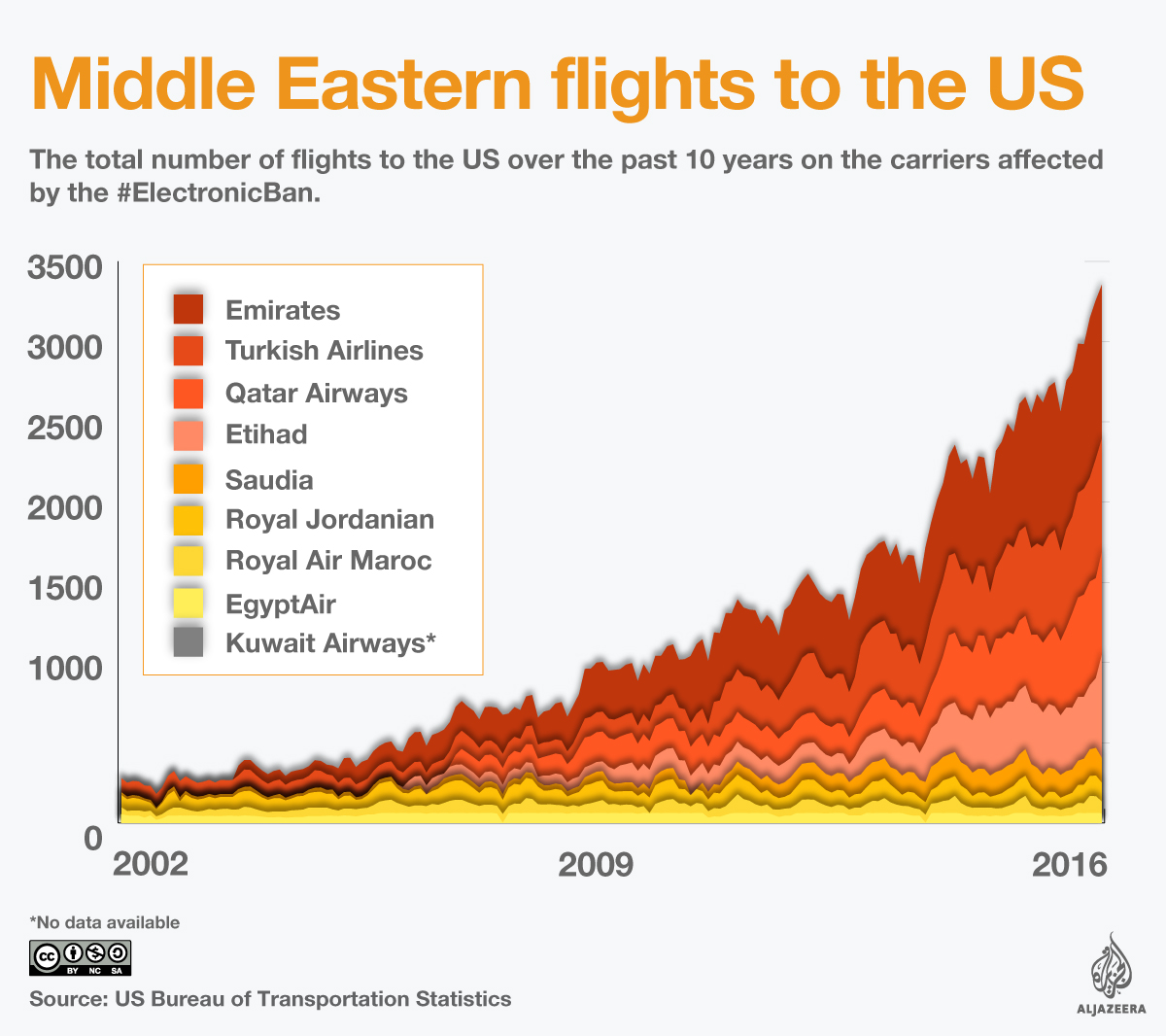US electronics ban for Middle East flights draws doubts
Gulf carriers have expanded their foothold in the US in recent years, prompting anger from US airlines.

Aviation experts are divided on the effectiveness of a US ban on large electronic items in hand luggage on flights inbound from a number of Middle Eastern states.
The US Department of Homeland Security announced the measure on Tuesday, citing the downing of an airliner in Egypt in 2015 and an attempt on a Somali passenger jet in 2016 using explosives smuggled on board.
Keep reading
list of 4 itemsHong Kong’s first monkey virus case – what do we know about the B virus?
Why will low birthrate in Europe trigger ‘Staggering social change’?
The Max Planck Society must end its unconditional support for Israel
A list of banned devices includes tablets, laptops, e-book readers and cameras, but not medical equipment and mobile phones.
The indefinite ban targets 10 airports in the Middle East and nine airlines, including Turkish Airlines and the major Gulf carriers: Emirates, Etihad and Qatar Airways.
“We have reason to be concerned about attempts by terrorist groups to circumvent aviation security and terrorist groups continue to target aviation interests,” US officials said in a statement.
READ MORE: Laptops, tablets to be banned on Middle East-US flights
However, aviation experts have cast doubt on that explanation and warned of the new dangers the measure could pose.
Saj Ahmad, chief analyst at the aviation consultancy StrategicAero Research, told Al Jazeera the announcement “flies in the face” of US Federal Aviation Authority rules on the carrying of lithium batteries in a plane’s cargo hold.
“[The rule] was put in place after the 2010 crash of a UPS 747 freighter in Dubai that caught fire while carrying such cargo,” he said, before describing the immediate inconvenience the ban would cause for passengers.
“Airlines will of course comply, but delays will be seen at airports for customers not aware of the rule changes.
“Compliance will cause delays and add costs – it might even force passengers to drop plans to fly to the US or instead look for an alternative transit point through Europe so that their devices can be taken in the cabin as normal.”
As the US ban currently applies, there is nothing stopping a passenger carrying the proscribed electronics boarding a flight to another region from one of the affected Middle Eastern airports, and later taking a connecting flight to the US, which Ahmad said demonstrated how “ill-conceived” the plan was.
“It does nothing to prevent security threats from places like France that have suffered a lot of terrorism in recent years – how would Homeland Security mitigate against a passenger from France with a device in the cabin in that situation?” Ahmad asked.
Gulf competition
The current US measure comes against the backdrop of US President Donald Trump‘s, as of yet, failed attempts to ban Muslims from several Middle Eastern states from entering the US, and also a fierce rivalry between Middle Eastern carriers and their American counterparts.
Ahmad said there was “merit [in the idea] that this ban could be seen as a way to stifle GCC [Gulf Cooperation Council] airline demand for travel to the US”.
In the past year, US airlines have urged their government to act against Gulf carriers, which have expanded services to the United States and have been eating into market share.
As recently as last week, an advocacy group representing American airlines – including American, Delta and United – paid for an open letter to Trump to be placed in the New York Times and New York Post newspapers.
“The billions of dollars in illegal Gulf carrier subsidies are brazen violations of our Open Skies agreements and a perfect example of the type of trade cheating that President Trump abhors,” Jill Zuckman, of the Partnership for Open and Fair Skies, said in the letter.

In February, the same group had asked to meet US Secretary of State Rex Tillerson regarding competition from Gulf airlines, but it is not known whether a meeting went ahead.
In January, Delta chief Ed Bastian told CNBC he was “optimistic” Trump would act against Gulf-based competitors.
Opponents of the Gulf carriers say they are threatening US jobs and the ability of US airlines to operate competitively, but the Gulf airlines themselves say they have a positive effect on the US economy.
Twelve hours later, #ElectronicBan looks like 50% #MuslimBan, 50% #AmericaFirst protectionism attacking the ME3, 0% real security issue.
— John Walton 🏳️🌈🇪🇺 (@thatjohn) March 21, 2017
Despite the backdrop of rivalry between Gulf carriers and their US competitors, aviation expert Keith Mackey told Al Jazeera’s NewsGrid that there were valid security threats that would justify such action.
“What happens is terror alerts are received throughout the world by governments; some of them are specific and some of them are non-specific and the agencies involved decide the safest course of action,” he said, citing previous incidences of groups like ISIL planting explosives in electronic gadgets.
“I’m sure when the situation is resolved, the ban will be lifted and things will go back to normal … I’m sure this wasn’t done as an anti-competitive measure,” Mackey added.
The UK’s announcement that it too is introducing a limited ban on electronic items lends weight to the idea that the inclusion of Middle Eastern airlines is due to security rather than competition.
![US airlines accuse Gulf carriers of receiving excessive government subsidies [Kamran Jebreili/AP photo]](/wp-content/uploads/2017/03/be7dd142990c441687d9e035106c2360_18.jpeg)
While there is no hint or mention of economic competition motivating Tuesday’s ban among US officials, frequent travellers between the US and the Middle East are considering making alternative arrangements to flying on Gulf airlines.
Joseph Lumbard, an academic at the University of Sharjah in the UAE, said he would now consider taking longer indirect routes through Europe to the US.
“I travel back to the US three to four times a year. I am currently examining my options,” he said, adding that higher paying business passengers would be most affected by the ban.
“Many of the most frequent fliers on such routes are the ones who need their laptops in order to use their time on the plane productively.
“Business travellers, those who tend to pay the most since they often buy tickets within a week or two of the flight, will be forced to reconsider which airline they use.”
Ashif Memon, a US citizen and cyber-security analyst based in Saudi Arabia, told Al Jazeera he would have no choice but to avoid travelling through the Gulf until the ban was lifted.
“No one is going to put expensive electronics full of personally or commercially sensitive data in checked luggage,” he said. “Your device will wind up getting stolen, imaged, or damaged.”
“It has changed our travel plans for sure. Aside from the material value, my laptop is full of sensitive data.”
|
|